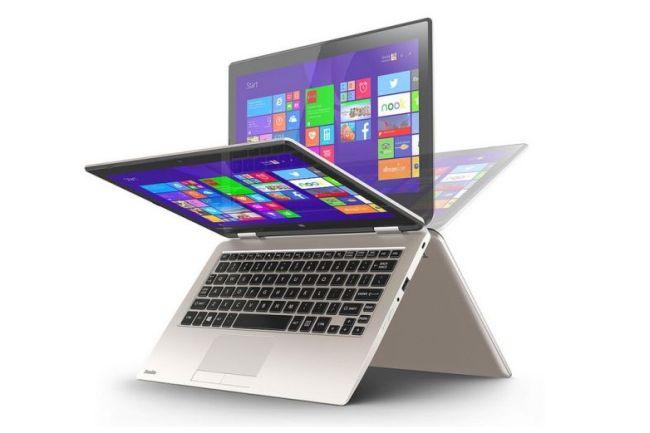
For instance, the Encore Mini is one of the cheapest brand-name tablets running full Windows 8.1. The 1080p Chromebook 2 is surprisingly inexpensive, for what it brings to the table. Now, we have the Radius 11, which is priced at just $330.
Advertised as a 2-in-1 machine, it can actually be used in five distinct modes: laptop, tablet, tabletop, presentation, and audience. True, the keyboard is fixed, so as a tablet, the Satellite Radius 11 isn’t exactly a featherweight. On the bright side, the touchscreen bends over fully at a 360-degree angle, and the keyboard automatically locks when you push the display all the way back. Speaking of which, the screen resolution can be described as mediocre at best — 1,366 × 768 pixels.
For $330 and up though, the 11.6-inch, 2-in-1 hybrid offers decent power, courtesy of Intel Pentium and Celeron processors. However, it’s unclear which exact CPUs will be available with this system. On the storage front, you’ll be able to opt for either a 32GB SSD, or a 500GB mechanical hard drive. The specifics on the CPU models and clock speeds are weirdly kept under wraps. What gives, Toshiba?
Toshiba says the Windows 8.1 convertible supports up to 4GB, so it sounds like there will be a configuration that offers 2GB as well. A full range of ports is included, consisting of USB 2.0, 3.0, and HDMI. An SD memory card slot is also available.
Another key selling point is the absence of fans, which keeps the Radius 11’s heft in check. The exact dimensions and weight aren’t provided either, but the Satellite Radius 11 seems pretty slim, at least when used as a “conventional” laptop.
Considering that Toshiba claims the Radius 11 is fan-less, we suspect that it will feature Intel’s new fan-free Core M, Broadwell-based processors.
Look for it in major retail locations across the U.S., as well as Toshiba Direct, starting October 26.


